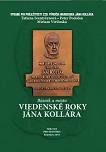Básnik a mesto : Viedenské roky Jána Kollára
Poet and a Place: Viennese Years of Jan Kollar
Author(s): Tatiana Ivantyšynová, Peter Podolan, Miriam Viršinská
Subject(s): History, Cultural history, Studies of Literature, Slovak Literature, 19th Century
Published by: SAV - Slovenská akadémia vied - Historický ústav SAV
Keywords: Jan Kollár; literature; culture; Vienna; 19th century; Slavs;
Summary/Abstract: The revolutionary years 1848 – 1849 had a significant impact on the lives of all people in the multi- ethnical Habsburg monarchy. The revolution brought the Austrian empire and its sovereign new issues which had to be solved inevitably. In the new circumstances the main task for the imperial court was the adjustment of the public administration in the country which was to be handed over to new and reliable people. At the beginning of 1849 the government created a new advisory institution. The governmental advisors became the main proponents of the Slovak issues at the governing circles in Vienna. Ján Kollár was named the adviser at the beginning of April 1849 and thus, after thirty years in Pest, he came to Vienna where he later also died. In his new role Kollár focused on solving the Slovak issue – national rights of Slovaks which, in his opinion, were to be extended in Hungary in a several phases. Firstly he pursued to completely and definitely eliminate magyarization and finally bring it to its end. Following this aim he made some elaborates for the government. One of them, about national administration is still undiscovered. In others he was dealing with changes in the school system and in the Lutheran church in the Habsburg monarchy. Both documents are summarizations of Kollár’s ideas about how school system and Lutheran church should function in the monarchy with the emphasis on language and national equality. While working as the governmental adviser he also engaged in other spheres. He used his good relationships with the Austrian governing authorities for the benefit of Slovaks. He recommended people whom he trusted for important posts. He managed to put through the so called Old Slovak language (Czech language with some Slovak elements) as a literary language, was zealous to establish a great Slovak principality and he made efforts to solve all contemporary problems of Slovaks in Hungary. Shortly after arriving in Vienna he found himself at the Vienna University as a professor of “Slavic archeology“, which made it possible for him to devote his time to his greatest passion, i. e. studying Slavic past and mythology towards the end of his life. Thanks to Kollár’s stay at the university, his last works were dedicated to the oldest history of Slavs in the European area. He became the pioneer of archeological research in which he tried to use the available scientific works and also to create new scientific terminology. Staroitalia slavjanska… with almost 900 pages was Kollar’s largest volume published. It was a mixture of the method of his previous scientific works aimed mainly at etymological explanation of national names (Rozprawy…, Sláwa Bohyně…) with a new archeological range. The last elaborated sphere of Kollár’s scientific interest at the end of the 1840s and the beginning of the 1850s were the so called Prillwitz idols allegedly representing the deity from Retra, about which, towards the end of his life, Kollár wrote a vast book with the same title which was never published.
- Print-ISBN-13: 978-80-970376-6-6
- Page Count: 144
- Publication Year: 2015
- Language: Slovak
- eBook-PDF
- Sample-PDF
- Table of Content
- Introduction

